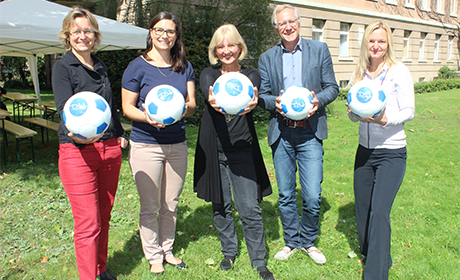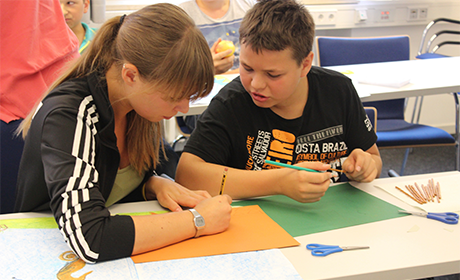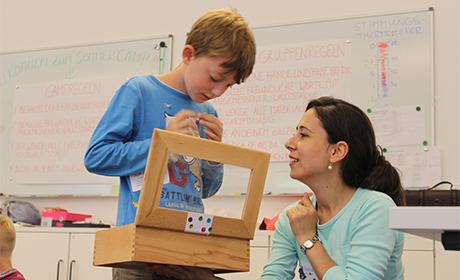At the Interface of Research and Care
The Center for Psychological Psychotherapy offers new treatment concepts for ADHD

Eva Vonderlin, Meike Leupold (Dietmar Hopp Foundation), Sabina Pauen, Hinrich Bents and Lysett Babocsai
They have a hard time sitting still, paying attention, following instructions, waiting or controlling their feelings. Children with the neuropsychological development disorder ADHD – attention deficit hyperactivity disorder – are significantly impaired in their everyday lives and often suffer severely from the effects of the typical symptoms. These symptoms also strain their personal relationships and cause constant conflict. Families dealing with the disorder can find help at the Center for Psychological Psychotherapy (ZPP) of Heidelberg University. In addition to offering the conventional treatment options for ADHD patients, for the last three years the ZPP has offered a scientifically monitored summer treatment camp for intensive therapy that has proven extremely successful. The goal of the model project is to have the new treatment concept adopted into the standard of care covered by health insurance so that more affected families can benefit.
"We are working at the interface between research and care, which means we can develop new concepts, test them, study them, and even offer them as treatment – but we also want to make them available to others," the ZPP Director Dr. Hinrich Bents explains. Specifically, a two-year model phase for the summer treatment camp was launched in 2014 with the financial support of the Dietmar Hopp Foundation to investigate the effectiveness of the treatment approach. It has the concomitant support of a scientific study in cooperation with Prof. Dr. Sabina Pauen from the Institute of Psychology. The model has proven so successful, the foundation has provided additional funding for its expansion and continued scientific study. At the same time, initial discussions with health insurance providers have begun.

The summer treatment camp (STC) is directed by Dr. Lysett Babocsai, who further developed the therapy concept that originated in the USA and adapted it for German-speaking countries. As cooperation partners, she enlisted Sabina Pauen and the Center for Psychological Psychotherapy as well as Dr. Eva Vonderlin, Director of Studies and the Outpatient Department for Child and Adolescent Psychotherapy at the ZPP. Instead of the standard 50-minute treatment per week, the STC uses an intensive treatment that has proven successful in children with ADHD. "The principle of reinforcement is central to the concept, meaning the children are rewarded for appropriate behaviour," explains Lysett Babocsai. They need a lot of input and praise at the appropriate times so that they can develop and establish the desired behaviour. "If the child hears only 'stop it', 'sit down', 'you're bothering me', then the synapses that should actually be developed shut down – so nothing new can occur. It takes time and real training that extends over hours – after all, you don't learn how to ride a bike by talking about it once a week," explains Hinrich Bents.

In the four-week day camp during the summer break, a team of 14 to 16 counsellors work with 20 children between the ages of 7 and 10 on the problems associated with the core ADHD symptoms: attention deficit, hyperactivity and impulsivity. The day consists of a variety of group activities in which the children are trained in the desired behaviour through clear instructions and numerous repetitions; they receive a lot of praise and positive feedback as reinforcement. Parents are also included in the STC treatment concept and learn the basic principles for dealing with the children as well as strategies for behaviour modification. "We have had a lot of very positive feedback from the parents that not only has their children's behaviour improved, but they themselves have also learned a great deal," states Eva Vonderlin.
The results of the accompanying study are also positive. Prior to the summer treatment camp, immediately thereafter, and then again three months later, the families are interviewed and the children tested in a number of ways. "In particular, there is a marked decline in social conflict, hence improvement in the children's social skills, as well as a drop in depressive tendencies," says Dr. Vonderlin. "The positive feedback gives children more self-confidence." The demand for places in the camp is therefore high. In future, the ZPP plans to offer the intensive therapy program four times a year and, in the second funding phase of the project, develop concepts for its permanent establishment so that it can also be incorporated into everyday life.

